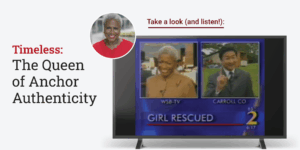
Wisdom and inspiration from the world beyond the newsroom.
We’re always trying to understand what the success people are having in other worlds can teach us about having more success in our own. This post is devoted to that quest and conversation.
A couple of months ago the New York Times posted an article about an influencer named Jenny Nicholson, whose review of Disney’s now-closed Star Wars Hotel was wracking up millions of views. Thinking it might be something they’d enjoy, I fired off a link to the article to my millenial daughter and her husband. Almost immediately, I received this text:
I WATCHED THIS AND THEN MADE MATT WATCH IT WE WERE RIVETED. It’s truly so good well worth your time and so unbelievable!! I’m not even a huge Star Wars person but she’s so entertaining and Matt is hard to keep engaged for four hours and he would come down like put it on put it on.
Here’s the thing. What Nicholson does Is pretty much what you see in the picture above. Sit and talk to the camera with a little B-roll and natsound from time to time. For four hours. With a voice that most news directors would reject out-of-hand If they were reviewing job candidates. Now my daughter Is exactly the person that television news creators would love to have glued to their content. Thirty-seven years old, female, disposable income. Having the ability to somehow hold her spellbound for two minutes, much less four hours, would be the holy grail of news delivery.
I decided to check it out for myself and, true confession, watched for over an hour and then went looking for other things Nicholson had done. In all of it, all she was doing was sitting and talking to the camera — and changing hats now and then. What could be compelling about that???
I played the first couple of minutes for a group of professional journalists — mostly millennial and Gen Z — during a workshop at this year’s NAHJ conference and asked them for reaction. She was compelling, they told me, because her delivery was so honestly unselfconscious. She wasn’t concerned or preoccupied with the way that she looked or sounded. She was just being herself. Unapologetically. And she was really smart. And she seemed to really care about the conversation she was having.
It’s not just Nicholson. I watch my wife and grown daughters return time and again to online presentations by beauty and makeup influencers. Though there are literally hundreds of options, they return routinely to the same ones and are very articulate about why they like them. It’s exactly the kind of loyalty and brand recognition that every news organization I work for would cherish.
I left the conversation with lots of thoughts, including these:
- There’s more to this than the obvious appeal to an audience obsessed with all things Disney or Star Wars. Jenny Nicholson — and others like her — have something to teach us about authenticity in delivery. We need to figure out what it is.
- Maybe as an industry we’ve been underestimating the future audience. Anyone that assumes younger viewers can’t give something concentrated attention for more than 10 seconds may be missing the point. Maybe they just have less tolerance for things that clearly aren’t interesting.
- Conversation can be interesting. Even mesmerizing. Without a lot of extra and expensive help. But it has to feel honest and real — and authentically passionate.
- The work is being interesting. Not being perfect. And really knowing your stuff.
For decades, the systems that have made our professional lives easier — robotics, teleprompters, computers — have also made it easier for anchors to disassociate from things they’re reading and saying. We may not have been producing fake news, but we have certainly been faking knowing the news.
If authenticity in delivery is a goal we really need to achieve, that jig may be up.
Also, the conversation about doing away with anchors is as old as the business. Remember the old debates about whether a newsroom was producing content-driven newscasts or personality-driven ones? Almost invariably, the content evangelists were thriving because their newscasts featured personalities viewers knew and loved and trusted, and the personality evangelists were fronting newscasts committed to compelling content. Day in and day out, my wife and daughters may choose whether to watch a segment based on the day’s content (think topical promotion), but going in they narrow the range of options to the personalities they already know and trust.
Nicholson has a head start because she has a following that already knows and trusts her. Because they’re loyal to her, they go in curious about what she has to say. When it comes to earning loyalty, content and personality have never been mutually exclusive. In the new world, just like in the old one, I’m betting the winners will be those who are good at both.


